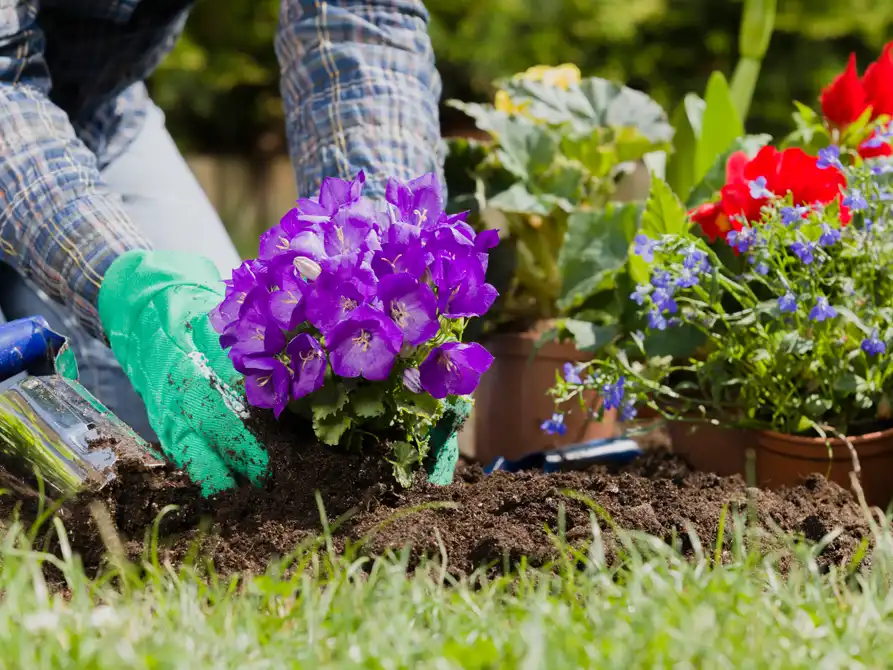Get Ready to Grow: 8 Tips for Planning a Summer Garden
As a homeowner, there are hundreds of things on your to-do list that grow every day. From cleaning the interior to exterior maintenance, it can seem like a never-ending effort. However, there’s one household chore that many people find both calming and rewarding—gardening. Whether you’re a seasoned gardener or a novice with a green thumb, there’s always something new to discover in the world of gardening. Here, we’ll give you a few strategies to maximize your garden’s potential and deal with common challenges.
8 Gardening Tips to Help You Grow Healthy Plants
Keeping a plant alive and thriving isn’t always the easiest thing to do, but that doesn’t mean you can’t develop a green thumb. To help you make the most of your garden and allow your plants to thrive, we’ve put together a few crucial pieces of information.
1. Start By Thinking About the Type of Garden
There are several different options when it comes to planting a garden. Some homes allow for beautiful in-ground gardens, while others might need to strategically create their own container gardens or line their property with potted plants. Luckily, if you take the time to consider what you want to plant and where, you won’t face many limitations. For example, vegetable gardening often needs enough space to accommodate a deep root system, but containers can be built large enough to do this—you’ll just need to invest in quite a lot of potting soil. Plus, with a little paint and decoration, tall containers can still complement your home’s exterior aesthetics like traditional garden designs.
Containers or raised beds are also great for homeowners with limited space who want a prolific garden. While it will take a bit of construction or DIY preparation, installing structures can impact your property value if they add aesthetics. So, be strategic, and if you’re not sure how to organize things to complement your home, ask a professional landscaper for some tips.
You can also incorporate a mix of garden types around your home. Use container beds for vegetables, then install rows of raised beds for larger flowers, and add smaller flowers that bloom brightly in the ground. This will give you a layered look that adds variety and helps you maximize your space.
2. Pick the Right Spot
Choosing the right spot for your summer vegetable garden and plants is also important. You’ll want to find an area in your yard that has fertile soil, enough drainage, and plenty of sun. You should also do a bit of research, as some plants or vegetables need full sun, while others only like a little. Try to do a soil test before it’s time to plant to ensure that you don’t wind up with a bunch of duds. If you find that the soil isn’t nutrient-dense, you can add some compost or fertilizer before it’s planting time.
3. Choose the Right Size
Building the perfect-sized garden is all about finding the balance between space, resources, and your gardening goals. The best way to do this is to consider what you want to grow and how much of a veggie garden you’ll actually use. Your property size will also determine your garden size. If this is your first time as a garden planner, it’s better to start small and expand as you gain experience and confidence. Gardens take a lot of work, and they shouldn’t become a chore that causes frustration. However, big gardens can be overwhelming, but you can always plant more if you need to add to smaller ones.
4. Keep Things Spaced Out
Spacing is key to ensure plants have enough room to thrive without overcrowding each other. So, you’ll want to research the specific spacing requirements for each type of plant you intend to grow and plan to give them a little more than what they “need.” This will give them the proper airflow and sunlight, so they can flourish. To help maximize your garden area, use techniques like companion planting, vertical gardening, and square foot gardening. Square foot gardening can help you maximize your space without overcrowding your plants. You can read more about how to do it here.
As things start to sprout, monitor your garden regularly and make adjustments as needed. Adjustments can include things such as thinning seedlings or transplanting overcrowded plants.
5. Plan to Plant Early and Often
Ideally, starting a spring garden will help ensure it blooms and produces crops by summer. So try to start early. You may also want to space out planting to help you enjoy yields at various intervals. Otherwise, you might find that all of your lettuce is ready at once, and you have to wait months before getting more. When you time the seedlings right, you can enjoy fresh vegetables every week.
6. Be Strategic About Your Choices
Your garden plan will also depend on where you live. Homeowners in hot, humid parts of the country will need to be strategic about their spring and summer plantings, as some seeds might not be able to thrive in extreme temperatures. These regions should stick to tropical plants that usually flourish in warmer climates. Some flower options include sunflowers, hibiscus, petunias, perennials, marigolds, geraniums, zinnias, and more. Luckily, these options will all refresh your space and give you a beautiful bloom to enjoy throughout the season.
There are also plenty of heat-tolerant shrubs that can be added to your property for landscaping and gardening in the early spring, so head to your local gardening store or check out some garden pictures for inspiration.
Some vegetables that are great to add to container gardens include:
- Cucumbers
- Carrots
- Peppers
- Tomatoes
- Beans
- Peas
- Eggplants
- Beets
- Cabbage
- Onion
- Zucchini
- Cauliflower
- Broccoli
- Sweet potatoes
- Potatoes
- Summer squash
Some veggies and herbs that are great to add to pots include:
- Spinach
- Lettuce
- Kale
- Parsley
- Basil
- Cilantro
- Rosemary
- Thyme
- Mint
- Dill
- Oregano
- Sage
7. Keep Pests at Bay
Preventing disease and pests is another crucial element to the longevity of your garden. To do this, practice good garden hygiene. This includes removing weeds or any debris regularly and picking fruits and vegetables when they’re ripe. Overripe foods can attract all kinds of bugs, which can lead to an investigation.
You can also confuse bugs and attract helpful insects like ladybugs and lacewings by planting a variety of things. To keep caterpillars and bigger insects out, you can use physical barriers like row covers or netting. Take the time to regularly inspect your garden and if you notice any signs of an infestation, you may need to use some pest control methods. If you find that rabbits or other animals are getting into your garden, additional barriers can be added.
8. Tend to Your Garden Regularly
The thing about gardening is that it’s an ongoing process. Even after you harvest your vegetables or see your flowers bloom, you need to keep caring for them to enjoy a successful growing season.
Regardless of if you’re an avid gardener or this will be your first attempt, the amount of water you give your crops and flowers is also important. To help you stay on top of a schedule, there are various smart home characteristics to help you automate your garden care. One option is installing a drip irrigation system that can be programmed based on the type of flowers or vegetables. It can also be adjusted for different seasons and turned off in the winter to help you get the most out of your garden this year.
Looking for More Garden Space?
Whether you’re becoming an avid gardener who needs more room in your yard or are simply ready for your next adventure, working with a seasoned real estate agent can help you find a new home for your seeds or transplants. At First Star Realty, our team of realtors will help you navigate the housing market to find a home with sunny locations for a garden or raised beds already built into the landscaping. We’ll also help you assess your home’s current value and navigate the entire buying and selling process, so you can focus on your day-to-day life.
First Star Realty is committed to providing five-star realtor services to Northwest Arkansas and can help you sell your home—or find a new one. Our team of real estate professionals is dedicated to providing exceptional, personalized service to our clients. Call us today at 479-267-1600 or fill out a contact form today.



